|
|
|
||
| home | table of contents |feature | record reviews | live shows | news | events |archive | record label | links | contact | ||
|
"Why
D'ya Do It"
I was curating some gigs at this club Tonic in New York and they had a different person every month do a different day of the week. And I had the month of Sundays and it was near Christmas and I really could not get anyone to play somewhere near Christmas. Everyone was going to be out of town. I just couldn’t find anyone to book. But I had good people: I booked Mark Eitzel. I booked Michael Gira. I booked Thalia Zedek from Come – one of her first solo things. There was an
opening so I was like, “Oh my god, maybe I should just have
a band.” So I got Jack and Barry to play and Siobhan Duffy
from the Gunga Din, and Jerome O’Brien. And we made a band.
Actually it was made out of the songs on that Solo Cholo
LP. That was kind of a tape that I started compiling. So I had all
these songs and I thought, “We could just play these songs
and be a cover band.” And it was really really good and really
fun. So we started playing some gigs and it was the start of Kid
Congo and the Pink Monkey Birds. Khan Right at this time came electronic music guy Khan. He saw us there and thought that I’d be a good person –see he was doing an album on Matador records, the No Comprendo album, and having guest singers, much like Die Haut, on his record, and called me out of the blue and asked me to be on his record.
Kid and Khan Really the start of it was that he had to tour to promote the album and he asked me to go on tour with him because he couldn’t obviously bring five guest singers with him. So we started to make more songs and I started to play on some of his songs. And he had been doing some stuff with Julee Cruise as a side project - so we started doing stuff with her and it just turned into a whole project that was really fun.
Kid and Khan did a lot of touring and a lot of different things. That was the thing with Khan, it was just the two of us so it was a much more mobile thing and it was also going into another world, the electronic music world – which he is a big part of and that’s who he is.
We had to overcome
a lot of prejudice from both communities. We had rockabillies coming
to our concerts because they heard The Cramps guy was here. We had
people yelling “Judas” at us for brining a guitar into
an electro club. It was very controversial at the time. Bad English We actually had the Bad English record done about three years before it actually came out. Electronic people couldn’t understand it and rock people couldn’t understand it. Finally we found Trans*Solar records who didn’t care about any of that. They just wanted something new and different and put it out. We decided that it should be called Bad English because that was really the one thing that stood in the way of our relationship – was that we would completely misunderstand each other all the time because English was not his first language and German wasn’t my first language and so there was also a lot of misunderstanding going on. We actually still do that but it’s much better now - it doesn’t matter now. But the album is a chronicle of our relationship. So it’s our little Fleetwood Mac sort of Rumours sort of album.
One of our
first concepts was to make an album that, “What if The Cramps
were actually making an album now that was modern? What would it
be like?” and that was one of our little nucleus ideas about
the record. Washing Machine
And also the
other good concept of Kid and Khan was that I was a Mexican and
he was Turkish – maybe that’s why we don’t get
along. We found that there was a real common bond between Mexican
culture and Turkish culture. We found that in Mexico. And he said
he really felt so at home in Mexico when he went there for some
crazy unknown reason. And when we went and played in Istanbul, I
felt kind of the same way. Like, “Oh, I understand this kind
of culture.” I even met his family and his cousins and went
to some family gatherings and it was really like a Mexican family
gathering in the way they conduct their social life. So we got down
with our roots. And also our on our new record, the new record that
we’re doing, we’re using a lot of Turkish influence
and maybe some Mexican language. Julee Cruise
I actually even performed with her live without Khan. She put a band together because she made a solo album after all the Khan stuff. I didn’t play on the record but I played live. In Kid and Khan and Julee Cruise we do a couple of the David Lynch songs but more electronic with beats. But with that band, it was actually a band playing and we did a lot more of those songs. And it was really great to play those songs – especially “Falling” and “Rockin' Back Inside My Heart” and weird hypnotic songs. A friend of mine was like, “It’s like having a good acting role.” And it’s really kind of weird to play songs from Twins Peaks and stuff. Strangely it was a fun role. Because I thought, “That albums so nothing – nothing going on.” But you listen to it and you have to learn the songs. They’re really bizarre arrangements. They’re really hypnotic but they actually change in really weird subtle ways. And it’s actually incredibly smart music. And Angelo Badalamenti made it. So it’s not that simple.
Continue to 14. "Black Bag": Kid Congo and the Pink Monkey Birds
Kid
Congo Powers Pt 2 home page | Kid
Congo Powers Oral History table of contents
© New York Night Train , 2005
|
||
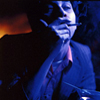
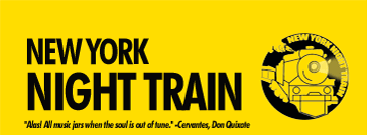
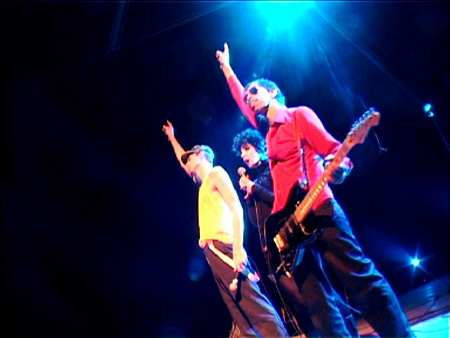
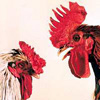 So
he came to my work and brought me this big stack of stuff he’d
done – this big stack of vinyl. And I took it home and play
it and thought he was really great. All the records were completely
different from each other. They were all electronic records but
they were really funny and some were really great experimental records
– and they were funny, and sexy and I saw a complete artist
– a really crazy crazy guy that was really appealing. And
I had really thought that I’d wanted to do something with
an electronic musician. For a long time I’d been thinking
that – but just the right idea – I didn’t know
how to do it myself and I didn’t have the right person –
and I thought, “OK, this could be a fun thing to do.”
And when we recorded that stuff we had so much fun and it was so
fun and different and funny that we decided to keep recording and
that was the start of our Kid and Khan collaboration.
So
he came to my work and brought me this big stack of stuff he’d
done – this big stack of vinyl. And I took it home and play
it and thought he was really great. All the records were completely
different from each other. They were all electronic records but
they were really funny and some were really great experimental records
– and they were funny, and sexy and I saw a complete artist
– a really crazy crazy guy that was really appealing. And
I had really thought that I’d wanted to do something with
an electronic musician. For a long time I’d been thinking
that – but just the right idea – I didn’t know
how to do it myself and I didn’t have the right person –
and I thought, “OK, this could be a fun thing to do.”
And when we recorded that stuff we had so much fun and it was so
fun and different and funny that we decided to keep recording and
that was the start of our Kid and Khan collaboration.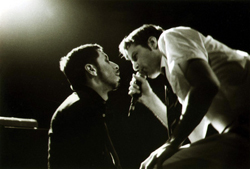 And
we started having an affair. He went to go live in Mexico for the
wintertime. So I went with him to Mexico and we actually recorded
the bulk of the Bad English album there – on the
Roland VS-16-80 – which I have in my bedroom right now. We
went on tour around the world a few times, did shows, and kept recording
the whole way. Eventually our affair was far too intense, that we
split up that but we kept working together because I felt that that
was where our relationship really was – was as friends and
as working partners. So that continues on to this day.
And
we started having an affair. He went to go live in Mexico for the
wintertime. So I went with him to Mexico and we actually recorded
the bulk of the Bad English album there – on the
Roland VS-16-80 – which I have in my bedroom right now. We
went on tour around the world a few times, did shows, and kept recording
the whole way. Eventually our affair was far too intense, that we
split up that but we kept working together because I felt that that
was where our relationship really was – was as friends and
as working partners. So that continues on to this day.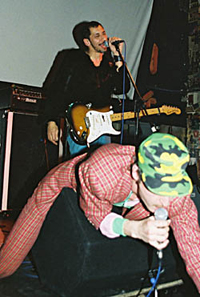 We
preceded the electro-clash trend – we were doing that before
that happened – years before. We were mixing the rock music
and the electronics and doing some crazy shit. He’s a great
live performer – really crazy. And actually I thought this
is the craziest thing I’ve done since The Cramps where I don’t
know what to happen and I don’t know what this guy’s
gonna do next. He’s gonna be jumping on top of someone, and
people are going to be taking their clothes off, and people are
going to be attacking us, and crazy crazy stuff, and he’s
gonna be hoisting me on top of his shoulders while I’m playing
guitar. It was a different experience and it totally changed my
mind about electronic music - because rockers always think electronic
music is going to be boring and you’re going to be so tied
down to a drum machine -but it wasn’t like that at all in
the least. It was actually more spontaneous than the Knoxville Girls
were and a much wilder and crazier experience. And so that made
me really excited and again I found myself somewhere else that I
didn’t expect to be just by circumstances – just by
saying “yes” to something.
We
preceded the electro-clash trend – we were doing that before
that happened – years before. We were mixing the rock music
and the electronics and doing some crazy shit. He’s a great
live performer – really crazy. And actually I thought this
is the craziest thing I’ve done since The Cramps where I don’t
know what to happen and I don’t know what this guy’s
gonna do next. He’s gonna be jumping on top of someone, and
people are going to be taking their clothes off, and people are
going to be attacking us, and crazy crazy stuff, and he’s
gonna be hoisting me on top of his shoulders while I’m playing
guitar. It was a different experience and it totally changed my
mind about electronic music - because rockers always think electronic
music is going to be boring and you’re going to be so tied
down to a drum machine -but it wasn’t like that at all in
the least. It was actually more spontaneous than the Knoxville Girls
were and a much wilder and crazier experience. And so that made
me really excited and again I found myself somewhere else that I
didn’t expect to be just by circumstances – just by
saying “yes” to something. 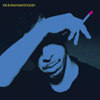 The
title and the cover was a tribute to Marian Faithful’s
Broken English album because we thought that that was a good
end-of-relationship album as well. And we even did a cover version
of “Why Did You Do It?” – which is a brilliant
song. And our take on it was, “that was a song written by
a man about a man talking about a woman talking to a man but then
it was sung by a woman talking to a man. So she changed the gender
and so we changed the gender back…again. So in that way we
had a little gender roll playing.
The
title and the cover was a tribute to Marian Faithful’s
Broken English album because we thought that that was a good
end-of-relationship album as well. And we even did a cover version
of “Why Did You Do It?” – which is a brilliant
song. And our take on it was, “that was a song written by
a man about a man talking about a woman talking to a man but then
it was sung by a woman talking to a man. So she changed the gender
and so we changed the gender back…again. So in that way we
had a little gender roll playing. And
off of that we had remixes done and those were for the dance-floor
audience. It was a record that was made for clubs because we didn’t
really get with the club people with the album because there were
way too many words and way too much tomfoolery and there were slow
songs. And so we got some mixes made. And we also had our friend
Christian Jendreiko do some mixes. And he’s a quite crazy
art/electronic guy. And so he made these really insane mixes and
we put that on it as well.
And
off of that we had remixes done and those were for the dance-floor
audience. It was a record that was made for clubs because we didn’t
really get with the club people with the album because there were
way too many words and way too much tomfoolery and there were slow
songs. And so we got some mixes made. And we also had our friend
Christian Jendreiko do some mixes. And he’s a quite crazy
art/electronic guy. And so he made these really insane mixes and
we put that on it as well. Through
Khan I met Julee Cruise because he was already playing with her.
So I was there so I kind of globbed onto that and became really
good friends with her. It’s funny because in Congo Norvell
so many people would compare that to Julee Cruise all the time.
Although I see her and Sally Norvell as being completely different,
I can see what it is because we had very moody sort of mood pieces.
And that’s what Julee’s stuff, especially her David
Lynch stuff, is like. And she’s a complete professional –
amazing singer – really really great. She’s spot-on
every night. And she’s real and she’s really a lot of
fun. Everyone thinks of her as this ethereal, angelic thing, but
boy, she’s got a mouth like a truck driver. And she can be
a hard lady. And I mean that in a good sense. She’s a tough,
tough lady - and super-talented.
Through
Khan I met Julee Cruise because he was already playing with her.
So I was there so I kind of globbed onto that and became really
good friends with her. It’s funny because in Congo Norvell
so many people would compare that to Julee Cruise all the time.
Although I see her and Sally Norvell as being completely different,
I can see what it is because we had very moody sort of mood pieces.
And that’s what Julee’s stuff, especially her David
Lynch stuff, is like. And she’s a complete professional –
amazing singer – really really great. She’s spot-on
every night. And she’s real and she’s really a lot of
fun. Everyone thinks of her as this ethereal, angelic thing, but
boy, she’s got a mouth like a truck driver. And she can be
a hard lady. And I mean that in a good sense. She’s a tough,
tough lady - and super-talented.